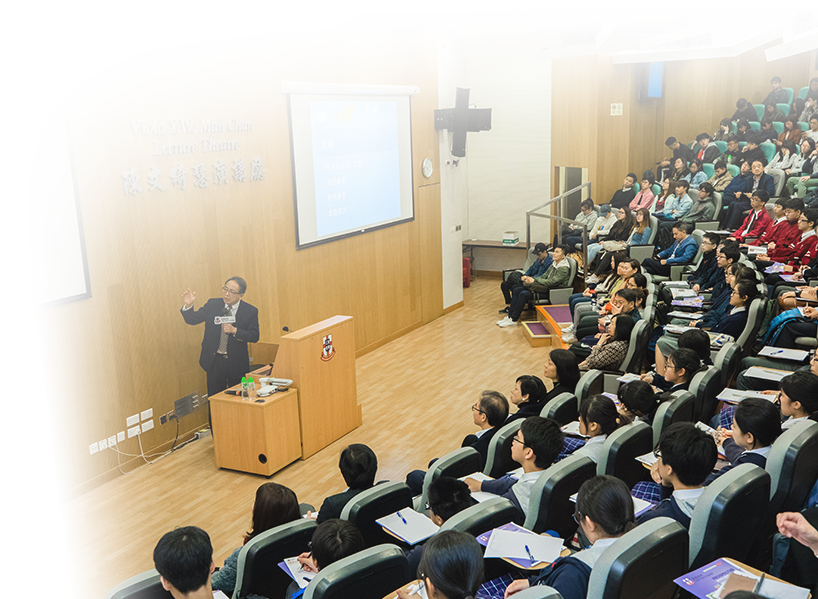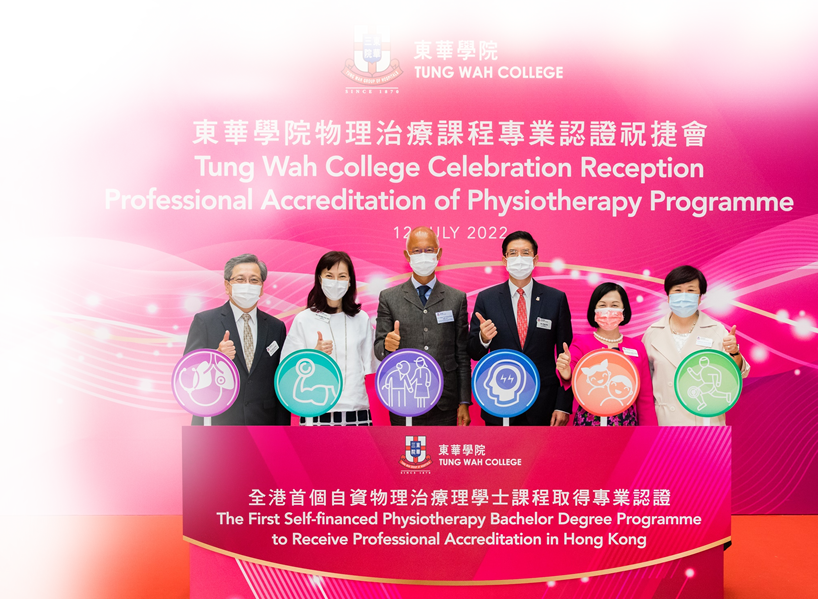About TWC

Admission

Programmes
-
Bachelor’s Degree Programmes
-
Sub Degree ProgrammesDiploma ProgrammeCertificate Programme
-
Mainland Admission



 News & EventsFAQ & Other InformationFrequently Asked Questions for Bachelor of Science (Honours) in Occupational TherapyQ1:What is the accreditation status of this programme?A1:The Programme is approved by the World Federation of Occupational Therapists (WFOT). Graduates will have a qualification that is recognized internationally.The Programme was successfully accredited by the Occupational Therapists Board (OTB) in June 2017 and the accreditation was approved by the Supplementary Medical Professions Council (SMPC).Q2:What are the differences between Occupational Therapy (OT) and Physiotherapy (PT)?A2:Both occupational therapists and physiotherapists are part of a team of health professionals. While occupational therapists often work alongside physiotherapists and there are certainly many similarities between the two, they differ in the specifics in how they help clients/patients address a disability.Physiotherapists use physical exercise and modalities to treat physical movement dysfunction, while occupational therapists use and adapt occupations to treat or prevent occupational dysfunction due to physical, mental or environmental factors. Occupational therapists also have the knowledge and training to work with people with a mental illness or emotional problems such as depression and/or stress.Another way to describe the difference between physiotherapy and occupational therapy is that a physiotherapist treats the patient’s actual impairment, while an occupational therapist treats that impairment in action. A physiotherapist tries to improve the impairment itself by increasing mobility, aligning bones and joints or lessening pain. An occupational therapist helps the patient complete necessary everyday tasks with the impairment. Doing so may involve applying adaptive tools and techniques.Q3:Is there any practicum for this programme? If yes, how and when will the practicum be arranged?A3:Students are required to satisfactorily complete at least 1000 hours of practicum prior to graduation. Practicum is divided into 4 different blocks spreading over 4 years of study, including summer breaks. Students will be placed in hospital and community settings. The duration of the practicums ranges from 2 weeks to 10 weeks.Q4:What is the career prospect for this programme?A4:Occupational Therapists are currently in great demand in hospitals and community or non-profit organization settings that include aged care centres, schools, nursing homes and rehabilitation facilities etc.Master Pay Scale (MPS)RankFirst PointMid PointLast PointOccupational Therapist II141924Q5:What kind of characteristics that you expect the students to have?A5:Besides good academic results, we expect the students to have a caring attitude, willingness to communicate and interact with others, a curious and creative mind for learning and an ability to manage time well.Q6:What are the special features of the Occupational Therapy Programme at TWC?A6:Besides meeting minimum standards of competence to practice as an occupational therapist upon graduation, we also put emphasis on equipping graduates with knowledge and skills to practise in various types of community setting and schools.In addition to lectures, we teach occupational therapy core courses through small groups, as well as using both specialized laboratories and real clinical settings for teaching. Close interaction between teaching staff and students also facilitates and monitors students’ progress in this demanding programme.
News & EventsFAQ & Other InformationFrequently Asked Questions for Bachelor of Science (Honours) in Occupational TherapyQ1:What is the accreditation status of this programme?A1:The Programme is approved by the World Federation of Occupational Therapists (WFOT). Graduates will have a qualification that is recognized internationally.The Programme was successfully accredited by the Occupational Therapists Board (OTB) in June 2017 and the accreditation was approved by the Supplementary Medical Professions Council (SMPC).Q2:What are the differences between Occupational Therapy (OT) and Physiotherapy (PT)?A2:Both occupational therapists and physiotherapists are part of a team of health professionals. While occupational therapists often work alongside physiotherapists and there are certainly many similarities between the two, they differ in the specifics in how they help clients/patients address a disability.Physiotherapists use physical exercise and modalities to treat physical movement dysfunction, while occupational therapists use and adapt occupations to treat or prevent occupational dysfunction due to physical, mental or environmental factors. Occupational therapists also have the knowledge and training to work with people with a mental illness or emotional problems such as depression and/or stress.Another way to describe the difference between physiotherapy and occupational therapy is that a physiotherapist treats the patient’s actual impairment, while an occupational therapist treats that impairment in action. A physiotherapist tries to improve the impairment itself by increasing mobility, aligning bones and joints or lessening pain. An occupational therapist helps the patient complete necessary everyday tasks with the impairment. Doing so may involve applying adaptive tools and techniques.Q3:Is there any practicum for this programme? If yes, how and when will the practicum be arranged?A3:Students are required to satisfactorily complete at least 1000 hours of practicum prior to graduation. Practicum is divided into 4 different blocks spreading over 4 years of study, including summer breaks. Students will be placed in hospital and community settings. The duration of the practicums ranges from 2 weeks to 10 weeks.Q4:What is the career prospect for this programme?A4:Occupational Therapists are currently in great demand in hospitals and community or non-profit organization settings that include aged care centres, schools, nursing homes and rehabilitation facilities etc.Master Pay Scale (MPS)RankFirst PointMid PointLast PointOccupational Therapist II141924Q5:What kind of characteristics that you expect the students to have?A5:Besides good academic results, we expect the students to have a caring attitude, willingness to communicate and interact with others, a curious and creative mind for learning and an ability to manage time well.Q6:What are the special features of the Occupational Therapy Programme at TWC?A6:Besides meeting minimum standards of competence to practice as an occupational therapist upon graduation, we also put emphasis on equipping graduates with knowledge and skills to practise in various types of community setting and schools.In addition to lectures, we teach occupational therapy core courses through small groups, as well as using both specialized laboratories and real clinical settings for teaching. Close interaction between teaching staff and students also facilitates and monitors students’ progress in this demanding programme.
Media CoverageNo. Date News Title 1 15 Apr 2020 東華獲職業治療學科評審資格 2 14 Apr 2020 東華學院獲職業治療學科範圍評審資格:邁開升格私立大學第一步 3 14 Apr 2020 東華學院首獲職業治療學科評審資格 學院:邁開升格私立大學第一步 4 15 Mar 2020 羅致光指康復服務短缺仍十分嚴重 3年內增加55.5%開支 5 15 Mar 2020 羅致光指康諮會正為殘疾服務定新方案 政府將資助理大及東華課程 6 13 Mar 2020 考取註冊資格 成為職業治療師 7 26 Dec 2017 奮發時刻 DSE #17 - 東華學院 (職業治療學理學士 (榮譽) 學位) (香港電台) 8 5 Jul 2017 東華學院職業治療獲專業認證 (明報) 9 5 Jul 2017 東華學院職業治療獲專業認證 (東方日報) 10 5 Jul 2017 東華職業治療獲專業認證 (星島日報) 11 5 Jul 2017 東華治療師課程獲認證 (文匯報) 12 5 Jul 2017 東華首屆職業治療畢業生月薪2.6萬 (大公報) 13 4 Jul 2017 東華學院自資職業治療學士課程獲認可 畢業即可執業月薪逾2.6萬 (HK01) 14 1 Jul 2017 東華職業治療學位獲認證 (東方日報) 15 2 Jun 2017 東華職業治療學畢業生做足準備 (頭條日報) 16 24 Dec 2016 何謂「職業治療師」? (信報) 17 5 Aug 2016 人口老化加劇 護理學額競爭烈 三自資校培訓註冊護士應需求 (星島日報) 18 11 Jul 2016 東華學院培訓專職醫療及復康專才 (明報) 19 27 May 2016 東華學院持續優化課程 優質教學質素獲肯定 (明報) 20 21 Jul 2015 《 通識.通通識》DSE升學系列—東華學院醫療科學學士(榮譽)學位及職業治療學理學士(榮譽)學位課程(DBC 數碼電台) 21 31 Mar 2015 東華學院懷舊房實習照料腦退化患者 (明報)
PROGRAMMES+ Bachelor’s Degree Programmes- Bachelor of Education (Honours) in Early Childhood Education
- Bachelor of Health Information and Services Management (Honours)
- Bachelor of Health Science (Honours) in Nursing
- Bachelor of Management (Honours) in Social and Business Sustainability
- Bachelor of Science (Honours) in Applied Gerontology
- Bachelor of Science (Honours) in Biomedical Science
- Bachelor of Science (Honours) in Forensic Biomedical Science
- Bachelor of Science (Honours) in Medical Imaging
- Bachelor of Science (Honours) in Medical Laboratory Science
- Bachelor of Science (Honours) in Occupational Therapy
- Bachelor of Science (Honours) in Physiotherapy
- Bachelor of Science (Honours) in Radiation Therapy
- Bachelor of Social Science (Honours) in Applied Psychology
-














